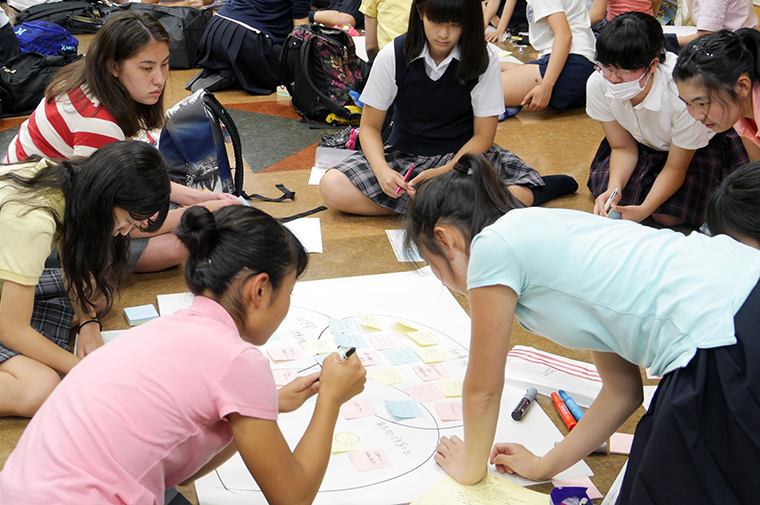This time, the Global Career Course was held with a focus on the theme of “Pre- Learning”, “Q&A”, and “Discussion” for 3 consecutive weeks.
Kenro Oshidari, the former Asia Director of the United Nations World Food Program (WFP), was invited as a lecturer. The lecture focused on the activities of Mr. Oshidari who ran the front line responders in emergency situations. He led a multinational staff.

In the first week, the students watched a documentary called “Jonetsu Tairiku (Continent of Passion)” produced by TBS and “Professional -Shigoto no Ryugi (Work Style)” produced by NHK as their “Pre-Learning”. Mr.Oshidari appears in both. While watching these programs, they took notes and made questions based on the information they learned.
The second week was a “Q&A” session. Students asked Mr. Oshidari questions when he came to the school.
“If we want to save lives, whatever the circumstances, we may need to break rules. I always want to do whatever I can to succeed.”
With this belief, he saved a lot of lives by delivering food to disaster struck areas and conflict zones.
The students asked a lot of questions about this.

“Why did you join WFP?”
“What is required to become a leader?”
“Why can you do such things for people?”
The students’ interest was very high, and the atmosphere in the venue was very enthusiastic with a wide range of questions including some about food support and the skills needed to become active in global environments.

“What I am always aware of is to work with passion, and what I can do to make my team happy. The job is done with the team and if the team is happy you can get over any challenges.”
“In the event of emergency assistance at natural disasters, tremendous speed is required. We have to go to the site without information, electricity, and water. I work on a lot of background support so that the staff can work without worrying too much on the ground.
Mr. Oshidari answered the students’ questions in detail and always looked them in the eye. The stories, which were backed up by his experiences of being responsible for “saving lives” in harsh situations strongly impacted the students.

“I think the earth is a small planet and people around the world should have a sense of being ‘a cohabitant of this planet’. To have compassion for those living with us is what I think a global person does. In order to have this mindset, you first need to know what is going on, so please have an interest to what’s happening around the world..”

Students responded to his message with applause.
Even after the end of the course, there was a long line of students excited heading to ask Mr. Oshidari questions.

The third week of the course was “Discussion”. They divided into groups of several people and exchanged opinions.
In order not to only listen to the stories and but also to connect to concrete actions, they started brainstorming with the themes “what we have learned” and “what we can do now”.

The poster paper given to each group was gradually buried under post-it notes with the ideas and things they learned written down on them. They summarized their opinions after they filled the post-its and shared what they felt with the other groups.

“I learned the importance of communication. As Mr.Oshidari said, it is important to talk about various things in the team, respect other opinions, and put them all together.”
“I will try not to be overwhelmed by press coverage. I should not just believe everything, and I want to find out and understand the actual truth by myself.”
“As a leader, I was able to learn how to organize my team members and think about their feelings.”

Finally, based on those opinions, all participants expanded on their ideas.
“I think it’s a good idea to search for overseas news! Even just by watching the notices that arrive on our phones, you can learn more about the world.”
“Let’s first speak up on our SNS and also tell people around us to learn about the world.”
Students carved the words “to know the world first” into their hearts. Even in this discussion, they drew out concrete actions that centered “knowing”.

The preparation and output process helped students be mindful of “real feelings” for things happening in the world by understanding the stories of people active around the world. It has become a cornerstone to expand the possibilities of this Global Career Course.





